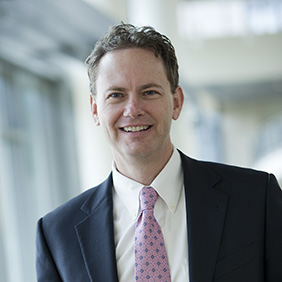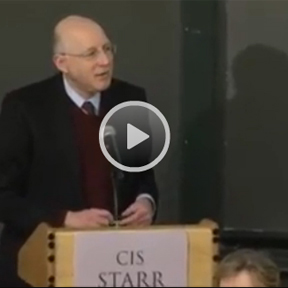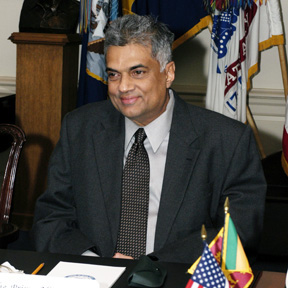In Major Extension of MIT Nuclear Policy Studies, Gavin Begins Work as First Frank Stanton Chair
by Peter Dunne, Political Science | Originally published here

Francis Gavin, Frank Stanton Chair in Nuclear Security Policy studies and Professor of Political Science
Politics has been part of human culture, and the subject of scholarly inquiry, for millennia. But only 70 years have passed since the epochal arrival of nuclear weapons, and our understanding of nuclear proliferation, deterrence, and arms control, and their complex relationships with traditional political issues, is still a work in progress.
The Department of Political Science and its interdisciplinary Security Studies Program (part of the Center for International Studies) have been deeply engaged with these topics since the 1970s. 2014 marks a major extension of this engagement, with the appointment of Francis Gavin as the first Frank Stanton Chair in Nuclear Policy Studies, on the strength of a $5 million endowment from the Stanton Foundation.
"We're in a renaissance of nuclear studies now, and MIT is at the center of it—a majority of the scholars whose work I most admire have come from this program," says Gavin, who joins the Institute after 14 years at the University of Texas at Austin, where he launched and led the Robert S. Strauss Center for International Security and Law and served as the first Tom Slick Professor of International Affairs at the Lyndon B. Johnson School of Public Affairs.
"The Security Studies Program brings together scientists and the engineering community; military people who have to deal with the realities of command and control, custody, and training; and people who worry about diplomacy and the politics that surround it," Gavin says. "It's a truly interdisciplinary environment, and it makes me feel like a student all over again."
Gavin earned PhD and master's degrees from the University of Pennsylvania, a master's degree from Oxford, and a bachelor's degree from the University of Chicago, and he has held numerous fellowships, including posts at Harvard's Kennedy School of Government and Center for International Affairs and a senior research fellowship at the Nobel Institute in Norway. He began work at MIT in January, and he is planning to teach graduate and undergraduate classes on nuclear politics and history and on international security and U.S. foreign policy.
He is also eager to encourage and facilitate "research that has true policy relevance—on front–page issues like Iran and North Korea," he says. "Our scholarship can help policymakers create better policies." To this end, he hopes to connect MIT with the Strauss Center's Nuclear Studies Research Initiative, which fosters collaboration among historians, political scientists, and policymakers.
The new chair honors distinguished CBS executive Frank Stanton, who was introduced to nuclear issues while serving on a presidential panel in 1954. Stanton's assignment was to develop a plan for maintaining national and international communications following a nuclear attack.
"The Stanton Foundation has provided incredible opportunities to develop better understanding of nuclear dangers, not just for me but for senior scholars at other universities, and for younger scholars with their fellowships," Gavin says.
The appointment of Gavin is somewhat unconventional, as he is a historian by training rather than a political scientist. "I don't know that there's another political science department in the country that would do that; it shows why MIT is such an extraordinary place," says Gavin, whose recently published "Nuclear Statecraft: History and Strategy in America's Atomic Age" draws on years of research into declassified archival documents to challenge conventional assumptions about how U.S. nuclear policy was developed.
"There was a sense among many of the great thinkers that the larger issues of nuclear dynamics were resolved 40 years ago," says Gavin, "but they weren't, and still aren't, and probably won't be. Wrestling with complex technical issues is often a challenge in the policy world and in a democracy, whether it's the National Security Agency, cyber warfare, or nuclear technology. It's important to understand the technology, but also to understand that everything is done in a political context, and frankly, it's the political context that matters more—politics always trumps technology."
With this in mind, Gavin says he hopes to expose students and researchers to the historian's thought process and methods, including quantitative and formal tools. "I'm convinced that to understand international politics, you have to understand history and think historically," he says. "What's so gratifying is that everyone in the department seems to agree, and that's rare. It's a big part of why this is my dream job — having the smartest colleagues and the best grad students, working in a friendly, collaborative organizational culture, and living in an area that's a Hollywood for intellectual life."
What's Next for Ukraine?
by Peter Dizikes, MIT News Office | Originally published here

The Center hosted a Starr Forum "What's Next for Ukraine" on March 14. Guest speakers included John Herbst, Director of the Center for Complex Operations at National Defense University and the former ambassador to Ukraine; Eugene Fishel, Division Chief in the Office of Russian and Eurasian Analysis of the Bureau of Intelligence and Research at the Department of State; Oxana Shevel, Associate Professor of Political Science at Tufts University; and Carol Saivetz, Research Affiliate at MIT Security Studies Program. Chairing the discussion was Barry Posen, Director of the MIT Security Studies Program and Ford International Professor of Political Science.
The political conflict between Russia and Ukraine continues to evolve rapidly: On Sunday, citizens in Crimea voted to secede from Ukraine and become part of Russia—a referendum other countries have said they will not recognize.
A group of experts on the region suggested during a public forum at MIT on Friday that the path forward is fraught with hurdles for everyone, not just Western leaders trying to impede Russia's attempts to annex Crimea.
"There is considerable room for miscalculation all the way around," said Eugene Fishel, division chief in the Office of Russian and Eurasian Analysis in the U.S. State Department's Bureau of Intelligence and Research.
While Western leaders are scrambling to find a way to limit Russia's actions, some of the panelists suggested that Russia could incur serious long–term costs from economic sanctions or reduced access to capital. Meanwhile, other former Soviet republics could become wary of their giant neighbor's ambitions.
The event—titled "Ukraine: What's Next?"—was part of the Starr Forum series of public discussions hosted by MIT's Center for International Studies. Barry Posen, the Ford International Professor of Political Science, and director of MIT's Security Studies Program, moderated the panel.
What is next?
Crimea has deep linguistic and social ties to Russia, but is geographically contiguous with Ukraine. Russian President Vladimir Putin has asserted that the Russian–speaking population in Crimea has been put at risk by radical groups in Ukraine; in recent weeks, Russian troops have massed along the Ukrainian border. For its part, Ukraine has little military capacity to wield in its own defense.
Western governments, including that of U.S. President Barack Obama, have weighed imposing various kinds of economic sanctions against Russia and its ruling elite as a means of limiting Russian actions. However, America's clout may be limited.
"Any [U.S.] sanctions, while useful, will not be nearly as persuasive as European sanctions," said John Herbst, who served as the U.S. ambassador to Ukraine from 2006 to 2009. After all, Herbst noted, many of Russia's financial dealings are with European countries, and high–level Russian political leaders and businesspeople have more of their assets in Europe.
But other panelists thought that sanctions could impose a steep long"term cost on Russia.
"I think it's very costly to Russia in the long run," said Carol Saivetz, a scholar of Russian policy and a research affiliate at MIT's Security Studies Program, referring to the threat of economic sanctions and the prospect of capital flight. Recent movements of Russian financial markets, Saivetz added, shows there are "economic costs even from fear of what the crisis might bring."
Saivetz also suggested that nearby countries might ask themselves, "Is this a sign for the future?" On the one hand, she said, "I don't think Putin wants to re–create the Soviet Union." But she added that Russian leaders appear to have a "fear of people power," and also appear to blame the West "for the so–called colored revolutions" in numerous countries, including Ukraine, in recent years.
The current conflict was triggered, in part, by the events of last November, when public protests broke out in Ukraine after then–president Viktor Yanukovych declined to sign a political agreement with the European Union. Protests continued in 2014, causing Yanukovych to depart office, with new elections scheduled for May.
Whatever the response of Western countries to the events in Crimea, Fishel said, the idea of one European country wresting territory from another should give observers pause in considering the larger geopolitical trajectory of the region.
"I don't think we … understand the full impact of what Russia is doing to Ukraine right now," Fishel said.
Reprinted with permission of MIT News.
3 Questions: John Tirman on the Warming U.S.–Iran Relationship
by Peter Dizikes, MIT News Office | Originally published here
The U.S. and Iran have had a largely antagonistic relationship since the Iranian Revolution of 1979. Could that be changing? In January, Iran and a U.S.–led group of six global powers agreed to an interim six–month deal that freezes Iran's nuclear weapons program, in exchange for the lifting of some economic sanctions. The progress on the issue indicates that U.S.–Iran difficulties are not wholly intractable, suggests John Tirman, a principal research scientist and executive director of MIT's Center for International Studies. Tirman is the co–editor of a new book on the subject, "U.S.–Iran Misperceptions: A Dialogue," just published by Bloomsbury Press, which features essays by scholars and policymakers from both countries. Tirman recently talked with MIT News about the topic.
Q. What are the main misperceptions on both sides of the U.S.–Iran relationship?
A. Well, there are so many. On the Iranian side, it's their belief that the U.S. has been out to get them for 60 years. It's not without some foundation, but it's exaggerated. One of the things that I think is important to understand about the U.S.-Iran relationship is that for Iran, the U.S. really is the dominant nation in their foreign policy. This Iranian sense of foreigners meddling to harm the nation is extremely strong. That's the strongest misperception on the part of Iran.
On the United States side … I think the perception of Iran—and we looked very closely at polling in the United States over a period of time from the beginning of the 1980s—has been pretty consistent. The American public views Iran as unreliable, irrational, out to cause trouble, wanting a nuclear weapon, and being hostile to Israel. Some of those things are true. And those two sets of perceptions are very much alive today.
Q. If there are so many misunderstandings between these two nations, then what are some of the potential substantive areas of agreement that may be undervalued right now?
A. It's been said by many people, not just me, that the United States and Iran have many overlapping interests on which they could find agreement. Part of it is just an interest in bringing stability to the region. It's the Arab states and Afghanistan and Turkey that are really in flux. The interesting thing about Iran during the period of the Islamic Republic is that is has generally not been expansionist … it has an interest in asserting its regional power, but it has for the most part shown an interest in stability. And we should encourage that. One way to encourage that is to come with some sort of agreement on diplomatic relations, and then to get the nuclear deal done, which I think is quite feasible. And of course to lower the rhetoric about Israel, which I think they've been doing. All these things are important to the U.S.
Q. The U.S. and other countries want to inhibit Iran's capacity to produce nuclear weapons; in return, they might lift economic sanctions. We've just had an interim deal on this. What needs to happen for a permanent agreement to be reached?
A. First of all, where we are today compared to a year ago is like night and day. It's easy for people to forget that the change has been remarkable. You can see the change in just the simple fact that the U.S. and Iran can talk any day, and do often, and we have the interim agreement. The talks are constructive; they're not just hurling insults at each other, for the first time in 35 years.
That's the result of the Iranian election, but it's also the result of the choices [Iranian President Hassan] Rouhani has made. He's very knowledgeable about international affairs, was a nuclear negotiator, and chose, in my opinion, the best possible person to be foreign minister, Mohammad Javad Zarif, who was educated in the U.S. He knows America, and one of the things that's really different is not just ideology, it's familiarity. Zarif understands the American political system, and previous Iranian leaders didn't have that feel. When [members of Congress] blast away at Iran, Zarif, I assume, understands when that's old–fashioned pandering to a domestic constituency. [Iranian politicians] do the same thing; we just don't read about it that much. But that kind of thing used to be misinterpreted. So that's a huge change.
The agreement itself, and the apparent sincerity and determination of the Iranians to make it work, are good signs. And I give [John] Kerry a lot of credit; he's been indefatigable as secretary of state. He's lucky he got Zarif as his counterpart, but luck has to be converted into something—and he has done that. One of the things Kerry and [President Barack Obama] have done well is to address some of the difficult areas on enrichment. They did that in the interim agreement, and they're going to have to do it again and sell it to Congress.
The outlines of the deal have always been apparent. The U.S. wants to stop [Iran] from enriching uranium to 20 percent, because that's the launching pad, so to speak, to get to breakout capability [to produce weapons]—and to get Iran to walk back a couple of other pathways to weaponization, and be very transparent about it. So it's a matter of making that more permanent in the comprehensive agreement and working out areas that have been left hazy.
The hard part is going to be getting Congress to lift the economic sanctions. There are some, apparently, [that Obama] can suspend, but there are some that Congress has got to change, and that's going to be very hard. A comprehensive agreement has to be written with stages in mind: Iran does X, we verify, until confidence is built and a case can be made to lift the sanctions. Whether Iran can swallow that timeframe is one of the big questions. But we're moving in the right direction.
Ranil Wickremesinghe, Former Prime Minister of Sri Lanka, Joins MIT

Ranil Wickremesinghe, former prime minister of Sri Lanka and a Robert E. Wilhelm Fellow at CIS
The Center has selected Ranil Wickremesinghe, a former prime minister of Sri Lanka, as a Robert E. Wilhelm fellow. The Sri Lankan politician and current leader of the Opposition in the Sri Lankan parliament will be at CIS for one month beginning April 8, 2014.
Wickremesinghe was prime minister of Sri Lanka twice, from May 7, 1993 to August 19, 1994 and from December 9, 2001 to April 6, 2004. A member of the United National Party he was appointed party leader in November 1994.
During his time at MIT, Wickremesinghe will study how to formulate a constitution sans an executive presidency. He will also work with faculty and students interested in Asian regional issues.
CIS director Richard Samuels, a specialist on Japan, where prime ministers have struggled to consolidate executive powers, has expressed his welcome to Wickremesinghe: "My colleagues and I are delighted that the former prime minister has accepted our invitation to return to MIT. We look forward to exploring Asian regional issues with him."
A generous gift from Robert E. Wilhelm supports the Center's Wilhelm fellowship. The fellowship is awarded to individuals who have held senior positions in public life and is open, for example, to heads of non–profit agencies, senior officials at the State Department or other government agencies, including ambassadors, or senior officials from the UN or other multilateral agencies. Previous Wilhelm fellows include: Ambassador Barbara Bodine, Ambassador Frances Deng, Admiral William Fallon, and Yukio Okamoto, a former special advisor to the prime minister of Japan.



